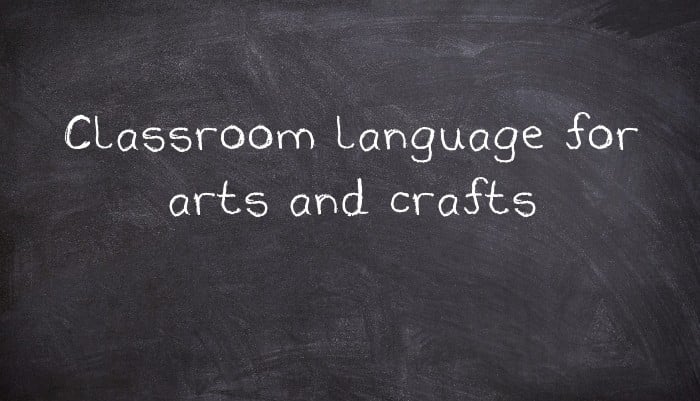Classroom language for arts and crafts
Objects
Normal classroom objects
Rubber (= Eraser)
Envelope
Stickers
Automatic pencil (= Mechanical pencil)
Drawing pin (= Thumbtack)
(HB) pencil
(Automatic pencil refill) leads
Tippex
Post Its
Pencil sharpener
Set square
Compass
Colour pencil (= Colouring pencil)
Rubber band
Protractor
(Pot of) glue/ Glue stick (= Pritt Stick)
(Double sided) sellotape
Sellotape dispenser
(Pair of) scissors
(12 inch) ruler
Blutack
(A piece of)/ (A packet of) A3/ A4 paper
Scrap paper
Paper knife
Hole punch
Stapler
Staples
Felt tip pen
(Permanent) marker
Crayon
Craft Supplies
Glitter
Coloured paper
Wrapping paper
Tissue paper
(A piece of)/ (A roll of)/ (A pack of) card
Cardboard
Pipe cleaners
Crepe paper
Photocopies/ handouts/ worksheets
Paint
Paint brush
String/ Thread/ Wool
Everyday objects that can be used for crafts
Egg box
Washing up bottle
Macaroni
Potato
Newspaper
Types of crafts
A collage
Paper machier
Colouring in
A (class/ group) project
A poster
A hand puppet/ finger puppet/ sock puppet (and stage)
A 3 model
Actions
Cut
Fold
Rip
Stick (together)
Attach
Staple
Punch (a hole in...)
Screw up
Colour
Draw
Shade
Copy
Shapes
Circle
Square
Rectangle (= Oblong)
(Equilateral/ Right angle) triangle
(Five pointed) star
Curve
Straight line
Parallel lines
Diamond
Egg shape (= Oval)
Cube
Pyramid
Tube
Funnel/ Cone
A... shape/ Shaped like a.../ The same shape as a...
Useful classroom phrases for teachers
"What shape is this?"
"Is this a square?"
"Do you want to use a triangle or a circle (for its nose)?"
"How many legs shall we add?"
"I want you to make different things each? Who wants to make a...?/ Hands up and tell me what you want to make"
"What do we do with scissors? Colour?"
"What do we cut with the scissors? My hair?"
"What's this?... That's right, rubbish. Where does rubbish go?... In the bin"
"Please pick up... from the floor?"
"Put down some newspaper first (to keep the table clean)"
"How can we make a hole (in this)?"
"What can we cut with? With a stapler?"
"Hands up and ask me for the things you need/ the colour you want"
"Can I have the... (s) back please?"
"Careful (with the glue/ scissors)"
"No running with scissors"/ "Turn the scissors around before you give them to someone"
"Do you want to try again?"
"(Try to) keep inside the lines"
"Only cut the dotted lines (not the solid lines)"
"Bring up your work when you have finished"
"Where do you want to put in on the notice board?"
"Very good. Ten out of ten/ Here's a sticker"
"Staple one end to the other"
"Put the string through the holes"
"How can we make a...?"
"What shapes can we use to make a...?"
"What does it look like if we put these shapes together?"/ "What can we make from these shapes"
"One (pair of scissors) between two/ per table"
"Come up and ask if you need a..."
"Make a line to have your.... checked"
"It's very imaginative (but not very neat)"
"Do you want me to show that to everyone/ to your parents?"
"Has anyone/ everyone finished?"
Useful classroom phrases for students
"(Can I have a)... please?"
"(I've) finished"
Discussion questions and language tasks for teachers
-
What's the difference between paper, card and cardboard? How can you explain this to your students?
-
What's the difference between a square and a rectangle? How can you explain this to your students?
-
How would you explain these things to your students?
-
How to make a house from cut out shapes
-
How to make a sock puppet
-
How to make a Chinese lantern
-
How much of the instructions above would you explain before you let them start making the crafts?
-
What are the potential dangers while doing crafts? What can you say to students and do to make these dangers less?
-
In what ways could doing arts and crafts lead to disruption and bad behaviour? What could you say and do to avoid this?
